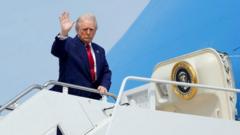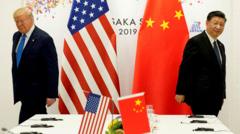China's Finance Ministry stated on Friday that it would impose a reciprocal 34 percent tariff on imports from the United States, mirroring President Trump's tariff strategy. Along with this measure, Beijing's Ministry of Commerce designated 11 American companies as "unreliable entities," effectively barring them from the Chinese market. Moreover, stringent export limitations have been placed on rare earth elements critical to various industries, including electronics and military applications. The customs agency has also halted chicken imports from several U.S. agricultural exporters. The swift nature of these actions signifies China's commitment to retaliate firmly in the ongoing trade war initiated by Trump's recent tariffs.
China Counteracts U.S. Tariffs with Equal Measures and Trade Restrictions

China Counteracts U.S. Tariffs with Equal Measures and Trade Restrictions
In a tit-for-tat response, China announces a 34% tariff on U.S. goods, ramping up trade tensions.
As the situation unfolds, the complex dynamics surrounding international trade are likely to continue evolving, affecting both nations and their global partnerships.
The implications of such tariffs could weigh heavily on both economies, leading to increased costs for consumers and businesses, disrupted supply chains, and potential long-term effects on international relations.
The ensuing trade conflict represents a significant juncture in U.S.-China relations, with both nations standing firm on their positions. As analysts observe, the unfolding situation requires continued scrutiny to understand its wider economic ramifications and diplomatic consequences.
The implications of such tariffs could weigh heavily on both economies, leading to increased costs for consumers and businesses, disrupted supply chains, and potential long-term effects on international relations.
The ensuing trade conflict represents a significant juncture in U.S.-China relations, with both nations standing firm on their positions. As analysts observe, the unfolding situation requires continued scrutiny to understand its wider economic ramifications and diplomatic consequences.





















